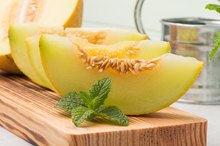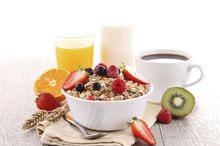What does fact checked mean?
At Healthfully, we strive to deliver objective content that is accurate and up-to-date. Our team periodically reviews articles in order to ensure content quality. The sources cited below consist of evidence from peer-reviewed journals, prominent medical organizations, academic associations, and government data.
The information contained on this site is for informational purposes only, and should not be used as a substitute for the advice of a professional health care provider. Please check with the appropriate physician regarding health questions and concerns. Although we strive to deliver accurate and up-to-date information, no guarantee to that effect is made.
Nutritional Content of Melons
Most melons are similar in their calorie and carbohydrate content, but the vitamin and mineral contents vary between each type of melon. Watermelon is lower in vitamins and minerals than most other melons, but contains antioxidants that provide its red color. On the other hand, casaba melon does not have as many antioxidants, but supplies more vitamin B-6 than other melons.
Watermelon
One cup of raw, diced watermelon contains 46 calories, nearly all of which come from 11.5 g of carbohydrates. One cup of watermelon contains less than 1 g of protein and fat. Although many fruits are high in fiber, watermelon is not. One cup contains only .6 g, which is less than 5 percent of the recommended dietary allowance, or RDA, of fiber for most adults. One cup of watermelon supplies less than 10 percent of the RDA of all vitamins and minerals except vitamin C. One cup provides 16 percent of the RDA of vitamin C for women, and 14 percent for men. Watermelon also contains lycopene, an antioxidant that may help prevent cell damage and boost the immune system.
- One cup of raw, diced watermelon contains 46 calories, nearly all of which come from 11.5 g of carbohydrates.
- One cup of watermelon supplies less than 10 percent of the RDA of all vitamins and minerals except vitamin C. One cup provides 16 percent of the RDA of vitamin C for women, and 14 percent for men.
Honeydew Melon
Nutritional Facts of Pineapples and Mangoes
Learn More
One cup of diced honeydew melon contains 61 calories, which are primarily made up of carbohydrates. A cup of honeydew melon also contains 15.5 g of carbohydrates, .9 g of protein and .2 g of fat. Although higher in fiber than watermelon, honeydew melon is still lower in fiber than most fruits. The 1.4 g in each cup provides 4 percent of your RDA. One cup of honeydew melon has 19 percent of the estimated minimum requirement, or EMR, of potassium, and more than 30 percent of the RDA for vitamin C.
- One cup of diced honeydew melon contains 61 calories, which are primarily made up of carbohydrates.
Cantaloupe
One cup of raw, diced cantaloupe contains 53 calories, which come from approximately 85 percent carbohydrates, 10 percent protein and 5 percent fat. One cup contains .3 g of fat, 1.3 g of protein and 12.7 g of carbohydrates 1. The cantaloupe contains 1.4 g of fiber, which is the same amount as one cup of honeydew melon. One cup of cantaloupe provides 21 percent of the EMR of potassium and more than 60 percent of the RDA of vitamin C. Cantaloupe is also high in vitamin A, with one cup supplying more than 25 percent of the RDA. Vitamin A is important for a proper vision and a healthy immune system 1.
Casaba Melon
Blood Sugar & Honeydew
Learn More
A cup of cubed casaba melon contains 48 calories, which are made up of 1.9 g of protein, .2 g of fat and 11.2 g of carbohydrates. One cup contains 1.5 g of fiber, which is slightly more than 5 percent of the RDA. One cup of casaba melon supplies 15 percent of the EMR of potassium and more than 40 percent of the RDA of vitamin C. One cup also provides 11 percent of the RDA of copper and 21 percent of vitamin B-6. Vitamin B-6 helps you make red blood cells, supports your nervous system and is necessary to break down your food for energy.
- A cup of cubed casaba melon contains 48 calories, which are made up of 1.9 g of protein, .2 g of fat and 11.2 g of carbohydrates.
Related Articles
References
- Center for Nutrition Policy and Promotion: Nutritional Goals
- Melons, honeydew, raw. FoodData Central. U.S. Department of Agriculture. Published April 1, 2019.
- University of Wisconsin Integrative Health. Managing dietary carbohydrates for better health. Updated October 2018.
- Gordon B. How much water do you need?. Academy of Nutrition and Dietetics. Updated March 2020.
- National Institutes of Health Office of Dietary Supplements. Folate fact sheet for health professionals. Updated March 11, 2020.
- Du H, Li L, Bennett D, et al. Fresh fruit consumption in relation to incident diabetes and diabetic vascular complications: A 7-y prospective study of 0.5 million Chinese adults. PLoS Med. 2017;14(4):e1002279. doi:10.1371/journal.pmed.1002279
- National Institutes of Health, Office of Dietary Supplements. Vitamin C fact sheet for health professionals. Updated February 27, 2020.
- Wolfram T. 5 top foods for eye health. Academy of Nutrition and Dietetics. Updated May 11, 2018.
- American Academy of Allergy Asthma and Immunology. Oral allergy syndrome (OAS) or pollen fruit syndrome (PFS).
- Foord K, MacKenzie J. Growing melons in the home garden. University of Minnesota Extension. Updated 2018.
- Brainard D, Heilig G, Manning J. How to grow melons. Michigan State University Extension. Updated May 23, 2016.
Writer Bio
Lisa Thompson has been writing since 2008, when she began writing for the Prevention website. She is a holistic health practitioner, nationally certified massage therapist and National Council on Strength and Fitness-certified personal trainer. Thompson also holds certificates in nutrition and herbology from the Natural Healing Institute, as well as a Master of Education from California State University.









